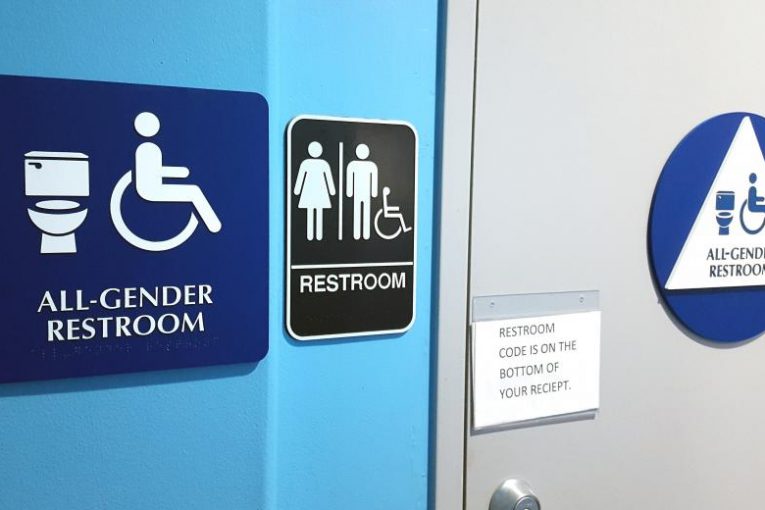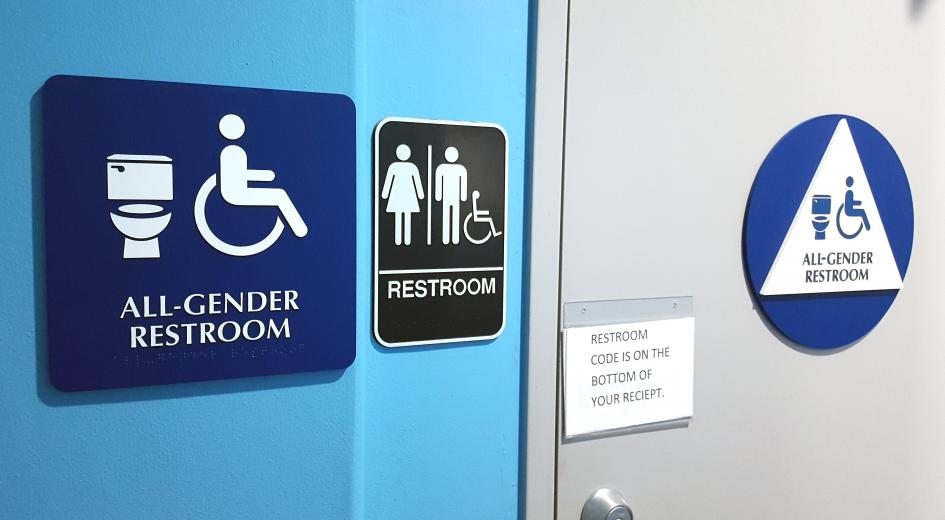

By Serene Chang and Anika Khubchandani
NASHVILLE, TN – A federal judge in Tennessee has blocked a law requiring businesses to post a warning sign if they allow transgender people to use public restrooms that match their gender.
The Tennessee chapter of the ACLU filed a federal lawsuit on behalf of business owners Kye Sayers, owner of a Chattanooga performing arts and community center called Sanctuary Performing Arts, and Bob Bernstein, owner of a Nashville restaurant called Fido.
Both business owners argue that the law is a clear violation of the First Amendment and is a “wasteful effort to defend discrimination.”
In addition, the ACLU asked the court for a preliminary injunction to prevent enforcement of the law until the end of the lawsuit.
“I am glad the court saw that forcing businesses to display a sign that hurts transgender and intersex people is unconstitutional,” said Sayers. “These signs would have damaged our businesses and the environment we have tried to create for our community, customers, and staff.”
Historically, the state of Tennessee has not been concerned with regulating how private businesses handle the issue of which persons are permitted to use which bathrooms.
However, on April 29, the Tennessee General Assembly passed H.B. 1182/SB 1224, mandating that any business open to the general public must “post notice at the entrance of each public restroom” if they permit “a member of either biological sex to use any public restroom within the building or facility.”
The court’s decision identified restaurants and performing spaces as not only businesses, but also critical locations for communities to “gather and grow together.”
The judges found enough compelling evidence to suggest that the new law would prevent businesses from being welcoming community spaces for transgender people.
According to Judge Aleta Trauger, who granted the preliminary injunction, “the right of freedom of thought protected by the First Amendment against state action includes both the right to speak freely and the right to refrain from speaking at all” as established by the Supreme Court case Wooley v. Maynard in 1977.
As reported by the Nashville Tennessean, the ACLU explains that the law is unconstitutional because it violates businesses’ First Amendment right “against compelled speech.”
In the past, courts have ruled that businesses can be obligated to publicly present “factual and uncontroversial” signs, but they cannot demand business owners display signs asserting a particular political stance.
LGBTQ rights advocates describe the law as “offensive and humiliating” in a Forbes article, drawing a connection with the broader push attempting to restrict transgender people from using the public restroom most accurately reflecting their gender identity.
“It is impossible to ascertain whether or not someone is transgender by looking at them,” writes the ACLU suit. “Plaintiffs do not have anyone guarding their restroom doors to ask for their birth certificates, inspect anyone’s genitals, or interrogate any other aspect of their sex.”
Recently, many Republican-controlled states have enacted policies and laws infringing on the rights of transgender and intersex people.
For example, West Virginia and Montana have banned transgender athletes from participating in school sports teams aligning with their gender identity. Earlier in May, Governor Lee Bill of Tennessee signed a law prohibiting trans students from using bathrooms and locker rooms that do not reflect their biological sex at birth.
Despite recent efforts made by Republican legislators and politicians to restrict the rights of transgender people, proponents of the law do not agree with the characterization of their policies and claim that they do not intend on displaying stigmatizing or controversial messages to their customers.
“I’m happy that the court stopped this invasive and decisive legislation for now and am hopeful this leads to a permanent ban of an unconstitutional violation of my freedom of speech rights,” Bernstein said.


People ofTennessee need to wake up to the amount of social engineering being forced down their throat and take action against it. If not, well, you can see how things turned out in California when the loonies started running the asylum.?
Just one person’s humble opinion
Sounds like it’s the opinion of someone who doesn’t have to worry about which bathroom they are supposed to pee in?
Or maybe he has a young daughter or grand daughter and doesn’t want men peeing in their bathroom?
That said I see no need to post warning signs on restrooms and have no problem with this injunction.
I fully agree with Virginia and Montana.
“Or maybe he has a young daughter or grand daughter and doesn’t want men peeing in their bathroom?”
That’s part of the problem. I have an employee who is transitioning from female to male. He is at the point where he fits in neither bathroom. He goes into the women’s room, he gets weird looks especially late in the day when he has five o’clock shadow. Goes into the men’s room, and he gets weird looks.
But I think the bigger issue is that restrooms haven’t kept up with the times.
It’s not just for transgender.
What happens if you have a parent with a child of the opposite gender who needs assistance, for the most part that’s been accepted.
But what about an adult who is developmentally disabled and has a caretaker of the opposite gender or a physically limited adult who needs assistance or a senior who needs assistance?
If you go into a large department store they accommodate with family restrooms but smaller places are problematic? Why haven’t we fixed that problem?
I agree bathrooms haven’t kept up with the times. Doesn’t work for all situations, but there are many places I’ve been to in the City (SF) that have a common sink area surrounded by private stalls (fully enclosed), such as in coffee houses or music venues. One at a large venue had had over 40 stalls and dozens of sinks! It worked fine.
Some issues are no so clean cut, such as:
Trans Nudity at Los Angeles Spa Roils City
https://www.advocate.com/transgender/2021/7/07/trans-nudity-los-angeles-spa-roils-city
Whereas true in the bathroom quote above from ACLU, at a spa, everyone’s genitals are exposed.
Define ‘gender’. Point is, there are different definitions.
Taken to the extreme, should a person be operated on in surgery based on their chosen gender?
In this case they are awake and struck down a law that would be anti liberty.
Withoyt that law, a business can still decide to put up a sign. Being required to put a sign would be social engineering.
To be anti social engineering is to not have such requirement.
I can immediately think of two surgeries where that might have “unintended consequences”…